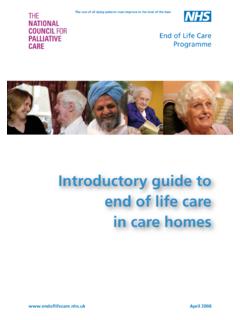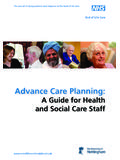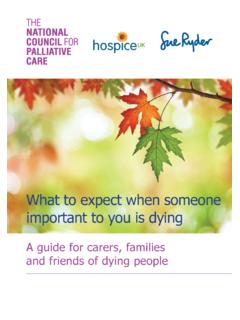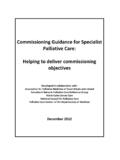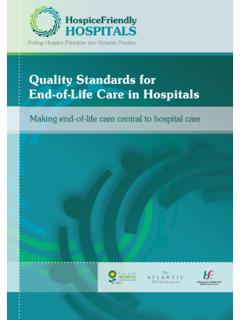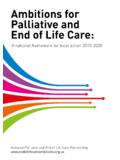Transcription of Public Health Approaches to End of Life Care - NCPC
1 Public Health Approaches to End of life CareA Toolkit2 The National Council for Palliative Care (NCPC) is the umbrella charity for all those involved in palliative, end of life and hospice care in England, Wales and Northern Ireland. We believe that everyone approaching the end of life has the right to the highest quality care and support, wherever they live, and whatever their condition. We work with government, Health and social care staff and people with personal experience to improve end of life care for all. The NCPC is a registered charity number 1005671 and a company limited by guarantee number 2644430. Visit for more information. About Dying Matters: Dying Matters is a national coalition led by the NCPC which aims to support changing knowledge, attitudes and behaviours towards dying, death and bereavement, and through this to make living and dying well the norm.
2 The Dying Matters Coalition, which has over 30,000 members, is working to address this by encouraging people to talk about their wishes towards the end of their lives, including how they would like to be cared for, where they want to die and their funeral plans, with friends, family and loved ones. Membership is free and will enable you to access a wide range of resources to help you talk about dying, death and bereavement. To find out more, or to join, visit: About The National Council for Palliative Care (NCPC) 3 About Public Health England This Toolkit was commissioned and supported in its development by Public Health EnglandPublic Health England exists to protect and improve the nation's Health and wellbeing and reduce Health inequalities.
3 It does this through advocacy, partnerships, world-class science, knowledge and intelligence, and the delivery of specialist Public Health services. PHE is an operationally autonomous executive agency of the Department of Health . 4 Aliki Karapliagkou, MSc, PhD., is a Research Fellow in the School of Health and Education at Middlesex University, London. She studied Sociology at the University of Plymouth and completed an MSc in Ethnicity and Multiculturalism at the University of Bristol. She was recently awarded her PhD from the University of Bath. Her doctoral work studied bereavement experiences in African-Caribbean communities in Britain. Aliki now works in end-of- life care and is extending her research and publications in this area. Allan Kellehear, PhD, AcSS.
4 , is Professor of Community Health at Middlesex University, London. He was formerly Professor of Sociology at the University of Bath (2006-11) and Professor of Palliative Care at La Trobe University in Australia (1998-2006). He is the author of Health Promoting Palliative Care (1999), Compassionate Cities: Public Health and End of life Care (2005) and co-editor with Libby Sallnow and Suresh Kumar of International Perspectives on Public Health and Palliative Care (2012). He is an Academician of the Academy of Social Sciences. We wish to acknowledge the following contributors to this toolkit. Kevin Agbodzah, BSc(Hons) who is an IT Project Officer at Middlesex University, London, worked on the illustration/content design structure and production of interactive toolkit.
5 We also wish to acknowledge Robyn Vaughan and Andrew Hewett for cover design and Alice Ekrek for proofreading. About the Authors 5 The Public Health approach to end-of- life care The Public Health approach to end-of- life care is concerned with social efforts led by a coalition of initiatives from governments, their state institutions, and communities, often in partnerships with Health and other social care organisations, to improve Health in the face of life -threatening/limiting illnesses, caregiving and bereavement. These efforts occur through Public education, improvement of social capital (trust, empathy and cooperation) and community development, enactment of laws, partnerships with Health services and their professionals, and the creation of safe and sustainable social and physical environments.
6 Compassionate communities represent a major form of community development efforts that aims to accommodate death, dying, loss and care into our Public Health ideas, and to create supportive environments for those experiences. Educa tional institutions, workplaces, faith organisations, trade unions and other social organisations and settings reflect upon their own end-of- life care experiences in order to develop their own local policies and responses to these experiences. Compassionate communities can be outcomes of multiple processes, negotiations and partnerships, but mainly involve community practice efforts initiated by healthcare services, sometimes enacted by governments but implemented and decided upon by communities themselves.
7 Compassionate communities involve policies created by communities themselves in order to actively involve citizens in their own end-of- life care concerns. In doing so they change social environments, cultures, conduct, and attitudes towards end-of- life experiences and care. 6 It is imperative for Public Health to include end-of- life care because: Public Health approach to end-of- life care expands thereach and effectiveness of end-of- life care services byengaging can address a greater range of needs including social,psychological and spiritual needs, and do so can raise awareness about death, dying, loss and can enlist communities in caring for their own at theend of a population Health sense, a Public Health approach isincomplete without provision of care for thoseexperiencing serious illness, ageing and frailty, long-termcare, and loss and disease, cancer, HIV.
8 And ageing - the majorconcerns of Public Health policy - also present major end-of- life care challenges that have wider Public healthimpacts beyond our clinical attempts to address end of life experiences often take place withincommunity contexts these are also logically the best siteswhere they can be effectively cared needs and wellbeing of dying, caring, and bereavedpeople are best met within a wider publichealth/community focussed approach to end-of- life carebecause many of the social morbidities associated withthe end of life are amenable to traditional Public healthmethods - Health promotion, Public education, orcommunity supports that result from increase of social capital(trust, empathy, cooperation) benefit experiences ofdeath, dying, loss and caregiving because they counteractserious psychological and social morbidities, such asdepression, anxiety, or loneliness, many of which can betraced to experiences of social isolation, neglect, Public Health approach to end-of- life care 7 This toolkit has been written for everyone who is interested in extending end-of- life care to community settings and developing Public Health responses to death, dying and loss.
9 Public Health end-of- life care has promising potential in today s increasingly diverse communities that need to adapt their responses and be flexible in order to meet unique and highly individualised compassionate approach to end-of- life care guarantees sustainable responses and networks of care that adapt and are flexible, depending upon need and demand. In compassionate communities citizens are encouraged to be knowledgeable and informed about death, dying, loss and care and adapt their practices and behaviour to meet needs that they encounter in their everyday lives. Services and local authorities play a significant role in providing and sustaining quality end-of- life care, but people from all walks of life should be involved in designing suitable end-of- life care policies that meet their needs.
10 This toolkit provides introductory information on the origins and development of modern end-of- life care, and explains how we can differentiate a service-oriented approach from a broader Public Health approach to death, dying, loss and care. It then proceeds to describe the development of this broader Public Health approach. We clarify the difference between service efforts to extend their services to community settings and an organised community response to end-of- life care issues and concerns. Communities with a Public Health approach to end-of- life care organise in ways in which the responsibility of care for experiences of death, dying and loss is shared between community members. Institutions and services design end-of- life care polices and practices that reinforce a compassionate attitude in times of death, dying and loss.
